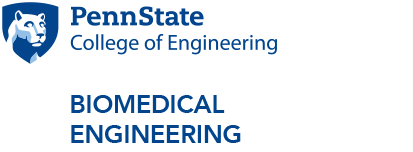
Summer Translational Cardiovascular Science Institute (STCSI)
The program will be held May 26 – July 31, 2026.
The Penn State Summer Translational Cardiovascular Science Institute, sponsored by the American Heart Association, is also supported by the Penn State Department of Biomedical Engineering, the College of Health and Human Development, the Eberly College of Science, and the Schreyer Honors College. The STCSI is available to any undergraduate student with a demonstrated interest in cardiovascular science.
The STCSI will fund up to 10 undergraduate students to conduct research related to cardiovascular disease, focusing in particular on the cellular mechanisms of cardiovascular disease pathology, the determinants of cardiovascular disease risk across the lifespan, and the development of cardiovascular device technology to address disease.
Stipend: A stipend of $6,000 will be provided for each student. There may be additional resources for meeting travel if used within 6 months of program completion. The program does not support housing or travel costs to and from Penn State.
In addition to conducting research, students will be required to attend seminars related to professional development and a weekly seminar series throughout the summer that will focus on four main areas:
- understanding cardiovascular disease risk incidence and assessment from infancy to old age,
- identifying the mechanisms that underlie cardiovascular pathophysiology using human and animal models,
- understanding behavioral intervention research strategies to positively affect cardiovascular disease risk, and
- identifying core technologies and novel applications of nano-scale biotechnology to better understand cardiovascular disease biology and development of novel therapeutic interventions.
Students will also be required to present a mid-summer update, participate in an end of summer research symposium, write a one-page narrative on experience, lessons learned, and further educational and career plans, and provide annual updates through the end of the AHA award.
Who Should Apply
The program is open to undergraduate students from any institution. Priority is given to students who demonstrate a strong interest in cardiovascular science, and have articulated specific interests in a participating faculty mentor's research (listed below).
Faculty Research
- Justin Brown
- Peter Butler
- Larry Cheng
- Patrick Drew
- Manyu Du
- Xiangming Ji
- Donna Korzick
- Josh Lambert
- Keefe Manning
- Scott Medina
- Hui Yang
- Joshua Gross
- Greg Shearer
Application Materials
The application requirements include general information, personal statement, unofficial transcript, and one recommendation letter. You are not required to contact the potential faculty mentor prior to submitting your application, but it would be to your benefit to do so to establish compatability and align expectations. If you are working with a faculty member that is not on the faculty list, please submit their name and email address in the application, and we will contact them to confirm their participation in our program.
The personal statement and unofficial transcript must be submitted to Ariel Christine at ajr311@psu.edu by March 23, 2026. The email subject line should state: STCSI Application. The recommendation letter should be submitted to Ariel Christine at ajr311@psu.edu by March 23, 2026.
Applicants can expect notification within four weeks of the deadline.
-
Contact Information
- For more information about application materials or general questions about the program:
- Ariel Christine
Undergraduate Program Assistant
ajr311@psu.edu
-
Faculty Contacts
- Keefe Manning, Ph.D.
Professor of Biomedical Engineering and Surgery
kbm10@psu.edu - Donna Korzick, Ph.D.
Professor of Physiology and Kinesiology
dhk102@psu.edu



